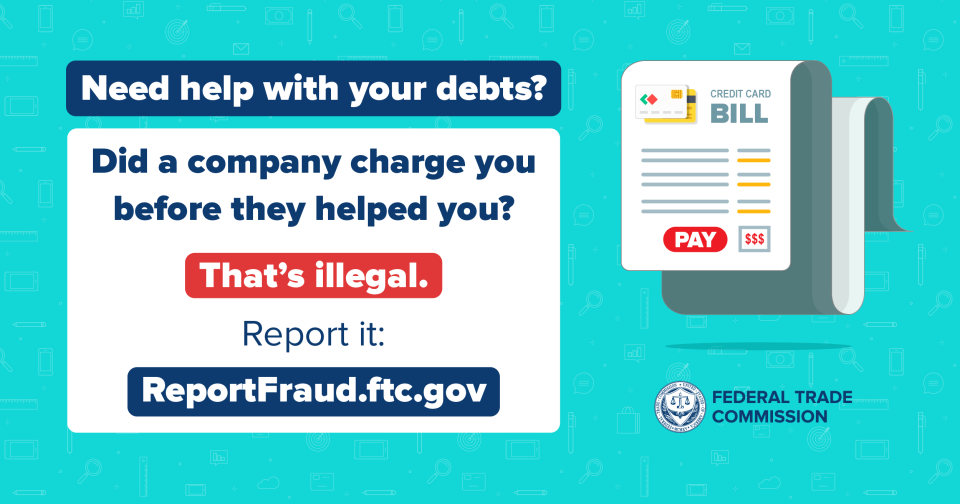Say you’re struggling to pay off your credits cards — which is already difficult with high interest rates — and you hear about a company that promises to reduce or eliminate your credit card debt for a fee. Sounds great, right? But how can you tell if that offer is legitimate or a scam?
The FTC recently announced settlements with the operators of a deceptive debt relief scam. The FTC sued the three operators and their related companies (which went by multiple names including ACRO Services) for taking tens of millions of dollars from people by falsely promising to eliminate or reduce their credit card debt. The scam charged people fees in the thousands of dollars and even told them to stop making payments to their credit card companies — leaving people in a far worse position — with damaged credit and owing their original debts plus thousands in fees and interest.
As part of the settlements with the FTC, these scammers are permanently banned from running any debt relief services or engaging in telemarketing, and they must turn over assets that will be used to provide any possible refunds to people affected by the scam.
Follow these steps to spot and avoid credit card debt relief scams.
- Don’t pay upfront. It’s illegal for a debt relief company to charge you a fee before they do anything to relieve your debt.
- Talk with your credit card company. For free. Call the customer service number on the back of your credit card. Ask for a payment plan that you’ll be able to afford.
- Consider a reputable credit counselor. They can help you develop a payment plan that works for you.
Spot a company making calls or claims like this? Report them at ReportFraud.ftc.gov.


It is your choice whether to submit a comment. If you do, you must create a user name, or we will not post your comment. The Federal Trade Commission Act authorizes this information collection for purposes of managing online comments. Comments and user names are part of the Federal Trade Commission’s (FTC) public records system, and user names also are part of the FTC’s computer user records system. We may routinely use these records as described in the FTC’s Privacy Act system notices. For more information on how the FTC handles information that we collect, please read our privacy policy.
The purpose of this blog and its comments section is to inform readers about Federal Trade Commission activity, and share information to help them avoid, report, and recover from fraud, scams, and bad business practices. Your thoughts, ideas, and concerns are welcome, and we encourage comments. But keep in mind, this is a moderated blog. We review all comments before they are posted, and we won’t post comments that don’t comply with our commenting policy. We expect commenters to treat each other and the blog writers with respect.
We don't edit comments to remove objectionable content, so please ensure that your comment contains none of the above. The comments posted on this blog become part of the public domain. To protect your privacy and the privacy of other people, please do not include personal information. Opinions in comments that appear in this blog belong to the individuals who expressed them. They do not belong to or represent views of the Federal Trade Commission.
Thank you for helping to get rid of scammers. Let's rid ourselves of fake robocallers as well.
Thank you so much for the information !
Long ago I decided to use a service (CCCS). I believe now they were a rip off. My monthly payment turned out to be lots more than if I paid my regular credit card payments. Got rid of them.
This scam has been around for 15 years. You just now putting out alerts? You guys need to step up you game a little better. I get at least 5 of these calls DAILY. YOU DO NOTHING TO STOP IT
In reply to This scam has been around… by Pokey
You can help law enforcement investigations by reporting unwanted calls to the FTC at www.ReportFraud.ftc.gov.
In reply to This scam has been around… by Pokey
You, too, share in the responsibility of stopping something.
What really irritates me about the constant advertising by multiple "credit fixers" on TV is that they say they can get your creditors to waive 50% of your owed debt. As my sister found out the hard way, having a creditor "forgive" money you owe almost always means you will receive an IRS Form 1099-C for the amount of the forgiven debt ... and will have to add that amount to your income and pay taxes on it as "normal income." Surprise!
In reply to What really irritates me… by Gecko
Had a friend go through that years ago ended up having to pay taxes on a pretty substantial amount. Sadly, unless you get a consolidation loan from a bank you know or declare bankruptcy, the only way out of debt is to just suck it up and pay it. In these current times you probably won't get the bank to do anything to help you out outside of the loans...and those won't happen unless you have some equity already. Own a house and have built up equity helps. Have a car that is fully paid off that helps a bit. Rent an apartment? Nope. Still owe on your car nope. Banks might give you a very small loan, but if you owe more than 5 thousand you are out of luck
In reply to Had a friend go through that… by Jason
Yup, that's very true...